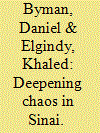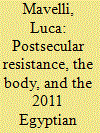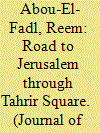| Srl | Item |
| 1 |
ID:
123198


|
|
|
|
|
| Publication |
2013.
|
| Summary/Abstract |
THE GROWING instability in Egypt's Sinai Peninsula represents one of the most dangerous, and most anticipated, crises in the Middle East. Even before the 2011 Egyptian revolution, the security vacuum in the Sinai allowed criminals and terrorists, including those with an ideology akin to Al Qaeda's, to expand their operations. In the chaos after the revolution, these problems have worsened. Meanwhile, various Palestinian groups use the Sinai as a launching pad for attacks against Israel.
|
|
|
|
|
|
|
|
|
|
|
|
|
|
|
|
| 2 |
ID:
117462


|
|
|
|
|
| Publication |
2012.
|
| Summary/Abstract |
At the heart of the notion of the postsecular is an implied and largely under-theorised idea of resistance against the pathologies of modern secular formations. This is most notably exemplified by Jürgen Habermas's highly influential approach which argues that these pathologies can be resisted through a cooperative cognitive effort of secular and religious consciousnesses. This article contends that this understanding overlooks more embodied forms of resistance to the effect that it curtails our capacity to conceptualise postsecular resistance in international relations. Following a contextualisation of Habermas's approach in the broader Kantian tradition to which it belongs, the article develops a contending Foucauldian reading of the body as a locus of resistance and uses this framework to analyse some of the events leading to the 2011 Egyptian revolution. The focus is on the publication of images and videos of police abuses by Egyptian bloggers and independent media as a practice of resistance to the widespread and systematic use of torture. The emotional response to these images, it will be argued, contributed to unite Egyptians despite longstanding fractures, most notably that between secularists and Islamists, thus turning the body from an 'inscribed surface of events' into a postsecular locus of resistance. The article concludes by highlighting the main implications of this analysis for future research agendas on the postsecular in international relations.
|
|
|
|
|
|
|
|
|
|
|
|
|
|
|
|
| 3 |
ID:
111230


|
|
|
|
|
| Publication |
2012.
|
| Summary/Abstract |
This article addresses an aspect of Egypt's 2011 revolution almost entirely ignored in most Western media accounts: Israel and Palestine as prominent themes of protest. In reviewing Egyptian mobilization opposing normalization and in support of the Palestinian cause starting from Sadat's peace initiative of the mid-1970s, the author shows how the anti-Mubarak movement that took off as of the mid-2000s built on the Palestine activism and networks already in place. While the trigger of the revolution and the focus of its first eighteen days was domestic change, the article shows how domestic and foreign policy issues (especially Israel and Palestine) were inextricably intertwined, with the leadership bodies of the revolution involved in both.
|
|
|
|
|
|
|
|
|
|
|
|
|
|
|
|